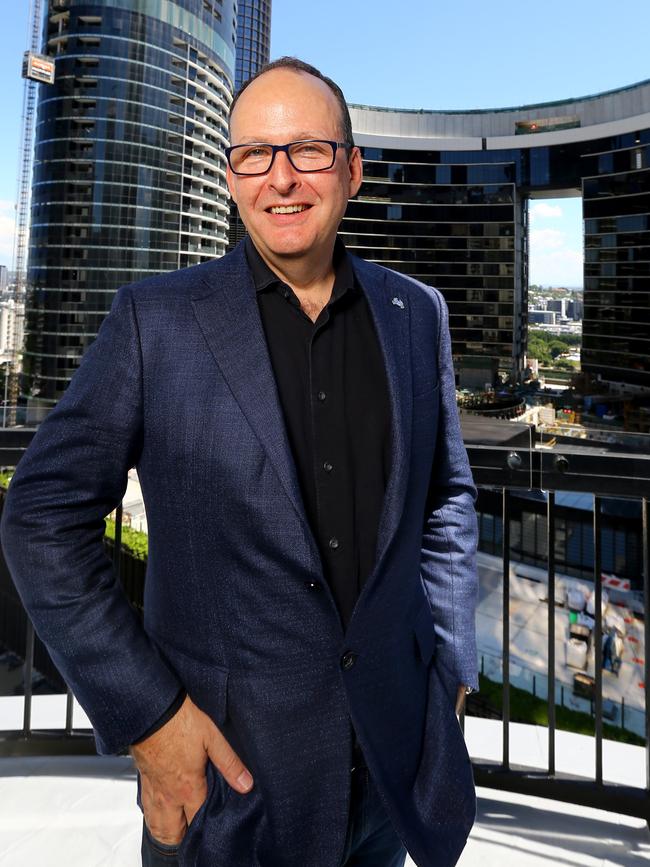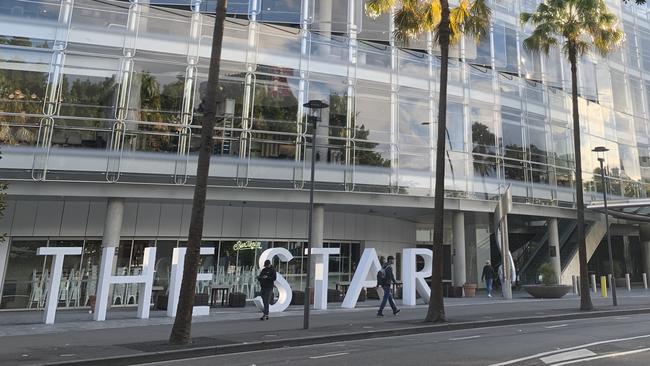Star and its regulator in open warfare over time for casino to change its ways
Star and its NSW regulator are at war over demands that change at the Sydney casino should be made at the cost of everything else.

Business
Don't miss out on the headlines from Business. Followed categories will be added to My News.
The relationship between The Star and its regulator deteriorated through the course of last year to the point where they were at war.
They’re the words that emerged from the rebooted Bell inquiry into Star and not journalist shorthand.
It got to the point where the Star’s chief executive Robbie Cooke and chair David Foster discussed launching legal action against the regulator and independent monitor and sought legal advice. “They are prepping for war. We better do the same,” Foster wrote in one text to Cooke. It is extraordinary how they got to this point, and from the outset it is unclear if there’s a way back for the casino.
And at the heart of the battle is the approach taken by Star Entertainment in its effort to change its ways, with Cooke facing substantial external and financial shocks over the course of 2023 while he attempted to right the ship following the damning findings of the first Bell review.

Star’s regulator through the NSW independent Casino Commission has been taking a single-minded and unyielding approach, demanding change at the Sydney casino, and that change should come at the cost of anything else – including its substantial operations in Queensland.
This was the testimony coming from Star’s NSW special manager Nick Weeks, who authored a report last October, some 12 months into his appointment, declaring Star had fallen short in many of the cultural changes and was moving too slow in other areas the original Bell report said needed to change. This observation was made despite the shocks Star was contending with and hundreds of changes already underway.
This report and a follow-up report by Weeks a month later formed much of the basis for NICC boss Philip Crawford demanding a meeting in December with Star’s board and making the extraordinary claim that he had lost confidence in Cooke.
The message for those who attended the meeting was clear, Crawford wanted them to sack Cooke. But they refused.
The Australian revealed that Cooke had offered his resignation after the December 7 meeting but Foster did not accept it. This spiralled into more clashes with the regulator and accusations that Star was spying on Weeks given Cooke had access to his calendar of meetings. The NICC has used this refusal as ammunition in the war to demand a reboot of Bell. In the next 15 weeks Adam Bell SC will probe whether Star and its management are deemed suitable to operate a casino.
Box-ticking
Over six hours of testimony Weeks issued some pointed criticism of Star. Indeed, he claimed it was moving too slowly in some areas like introducing a new group structure. It was unable to fill some crucial executive roles, such as the Sydney operations boss, while operational measures like knowing its customers were well behind.
His report also found Star was moving ahead in building better controls in other areas like financial crime. There were concerns about the progress of cultural change on the gaming room floor, including safe gambling measures. There were also concerns that nine of the 12 executives promoted by Cooke at Star were there during the bad old days pre-Bell. This was discussed at the board level and it was noted that no findings were made against the staffers, nor was there any evidence of wrongdoing – the NICC has demanded this in writing.

The sum of Weeks’ report card was that a significant amount of work still needed to be done.
Weeks concedes his assessment, built around the October 7 report, looked backwards and not forward. There were complicated changes involved and Star was moving ahead in some areas that he had highlighted since that report, he acknowledged.
The report also called out that there wasn’t a collegiate management in place at Star. However Weeks conceded that Star’s new executive team had only been in place for three months by the time he had written his report which is barely enough time to build a team.
What’s clear from Weeks’ testimony was that the regulator was pushing Star to do more at a faster rate. Indeed it appears the regulator was not interested in an outcome of genuine change rather than an exercise in box ticking.
Cultural change
Was Star deliberately dragging its feet on some of the more difficult areas of cultural change? Or was it a matter of the scale of the program required time to put in place? When Cooke commenced in the role of CEO in October 2022 he said cultural change was a multi-year journey. It was 12 months later that Weeks penned his damning report calling out Star’s shortfalls.
Cultural change efforts are slow going and they are not linear. By their name they involve weeding out some behaviour and this will put many offside in the early days. Any executive that has lived through a major program will say first two years are the toughest. The deeper the change program runs, the harder it becomes.
Add into the mix a company, like Star, weakened out of Covid and facing financial pressure. Cooke and his team had to get two capital raisings away and renegotiate bank debt, all while managing the introduction of a higher casino levy from the NSW government.
A company in constant state of crisis makes recruitment hard. Some executives will draw a line at working for a casino, and the fallout from the Bell inquiry including courting offshore criminals and bad actors makes it even more difficult for a brand like Star to attract serious executive talent.
Weeks was expecting faster progress and it didn’t happen. But is this enough to push for an escalation so that the regular demands the sacking of the CEO in charge of the program? Surely there’s another way forward.
Under questioning by the inquiry’s counsel, Weeks admitted cultural change is a multi-year exercise. And while Star had made only modest headway “that’s probably consistent with the proposition that long term cultural change takes a long time”.
Experience counts
For sure, Cooke's performance and accountability deserves to be tested. Investors were paying him big dollars and had trusted him with the immense job of bringing Star back from the brink.
And more importantly Star’s very existence hinges on it showing it has changed its ways and getting its Sydney licence back, so there is much at stake. The usual test is at the annual meeting, but the NICC has hijacked the process.
Still, Cooke’s experience in driving change programs deserves to be noted. He has managed four ASX-listed companies including Star and taking two of those to a stockmarket listing.
One of the companies, Tyro, involved working with a heavy-duty banking regulator – APRA – for a banking licence. Another, Tatts, involved close relationships with gaming regulators across a number of states. Cooke knows what he is doing.

Contrast this with Weeks who is singularly making the assessments about Star’s future. He is a lawyer by training. While those who have worked with him say he is smart, Weeks has never managed a company or an operational division of any substance. Nor according to public material has Weeks sat in a boardroom as an independent director or as a chair. It’s one thing to be making observations about where Star is falling short, its another to be accountable for decisions.
This is important, because Weeks’ view, particularly on measures such as culture, form the foundation of NICC's decision-making over who Star should have as CEO or even on the life and death matter over whether it should keep its licence.
Weeks complained about material being produced to the board being too “voluminous”, sometimes running to 1000 pages with only a limited amount of time to digest the information. “It was a large amount of information but it was short on insights,” Weeks said, a complaint that echoes the line of many directors of large regulated companies.
Where to?
More pointed for Star’s investors and employees and major stakeholder, the NSW government, given such a public falling out, where does the relationship go from here? Cooke has gone and the Foster-led board remains in place. Foster is executive chair and seeking to recruit a new CEO.
And even though Star is a multi-billion listed company – albeit after last Friday’s downgrade a smaller one – there is a power imbalance between the NSW regulator and the casino, with the regulator holding all the cards.
Should Star’s board – which has a bigger picture to content with and real competing demands from other regulators in Austrac, Queensland’s Office of Liquor and Gaming Regulation and even ASIC – jump at every request of the NSW regulator? It looks like they are doing what companies do – prioritising processes.
It is a glaring gap that “Bell two” does not have the terms of reference to ask whether the NICC's demands are realistic for the huge repair job needed at Star.
johnstone@theaustralian.com.au
More Coverage
Originally published as Star and its regulator in open warfare over time for casino to change its ways





